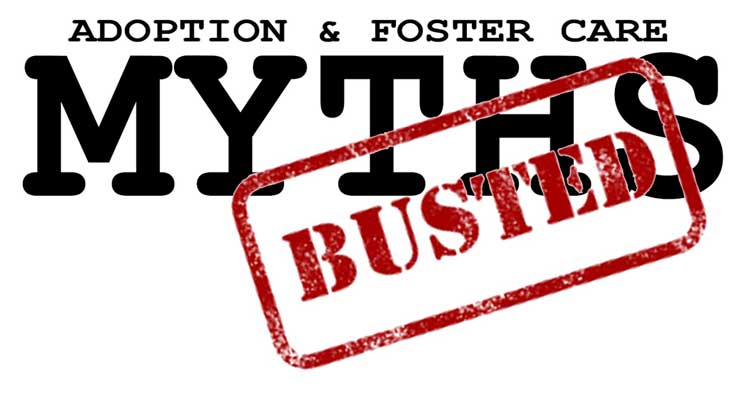Myths and Realities About Foster Care and Adoption in West Virginia
MYTH:
You have to have a lot of money and own a house to foster or adopt.
REALITY:
You don’t need to own your own home, or be wealthy to foster or adopt. There are no specific costs to be certified as a foster parent (there may be small costs such as background checks or purchasing something for your home, such as a smoke detector). Most adoptions from foster care are free and any minimal costs associated with them are often reimbursable. In addition, there are different types of post-adoption resources, such as medical assistance and adoption subsidy, based on the specific needs of a child, to help support and sustain adoptions from the foster care system.
MYTH:
Each child has to have a room of their own.
REALITY:
Each child needs a bed of their own, not a bedroom of their own. (Children sharing a bedroom must be of the same gender). They also need a space for their personal belongings. In some instances, however, there may be child-to-square-feet requirements or behavioral concerns that will prevent children from being able to share a room.
MYTH:
I could never do foster care because I would get too attached to the child(ren) and be too upset when/if they leave.
REALITY:
Children who have experienced abuse and/or neglect need foster parents who will provide care and love and yes, get attached to them. Most foster parents feel that the heartache they may experience when a child leaves is worth it to know that they helped a child who needed them. The primary goal of the foster care system is to reunify families, when it can happen safely. Foster parents who can provide temporary, loving care for children are an important part of this process.
MYTH:
A birth parent or another relative can take an adopted child back.
REALITY:
Adoptions of children from foster care are legally binding agreements that do not occur until the rights of all parents have been legally terminated by a court of law.
MYTH:
Only married heterosexual couples can foster or adopt.
REALITY:
Families of all shapes and sizes foster and adopt. You can be married, single, divorced, or cohabiting. There is no “perfect” type of foster or adoptive family— all types of families are needed for all types of kids.
MYTH:
Children end up in foster care because of their own juvenile delinquency.
REALITY:
Nearly half of Americans incorrectly believe that children end up in foster care because of their own juvenile delinquency — that they are “too bad” or troublesome to deserve a loving family. In actuality, these children enter the system due to parental abuse or neglect, not through any fault of their own. Children who do exhibit behaviors can respond to the safe and supportive environment of a foster/adoptive home which leads to better coping skills. It can be very rewarding to see a child respond to the love and positive reinforcements of their family.
MYTH:
Foster/Adoptive Parents need to be under the age of 50.
REALITY:
According to the Dave Thomas Foundation for Adoption, almost one in four adopted children live with a parent who is 55 years or older. What matters is a parent’s willingness to commit to parenthood. WV policy requires that foster/adoptive parents be between the ages of 21 and 65.
MYTH:
I have to be a stay-at-home parent.
REALITY:
Parents can work full-time jobs and use childcare options. Financial childcare assistance is provided for parents who work full-time.
MYTH:
I cannot have pets in my home if I am a foster/adoptive parent.
REALITY:
Foster/Adoptive parents can have pets in their home. WV Policy requires all pets kept at the home must have proof of vaccination/certification which is required by West Virginia Code §19-20A-2. If the animal is sickly or vicious, it must be confined in an area not accessible to children. Children will be instructed in the proper care methods before they are allowed to handle or care for an animal. All children must be carefully supervised when handling or caring for an animal.
MYTH:
I have to have parenting experience to become a foster parent.
REALITY:
There many foster parents that do not have biological children. Foster parents are responsible adults who have made a commitment to care for a children in need of a safe and loving home with a family to provide them with love and support. There are also resource available for foster/adoptive parents who seek support and training on parenting issues.
MYTH:
I cannot have pets in my home if I am a foster/adoptive parent.
REALITY:
Foster/Adoptive parents can have pets in their home. WV Policy requires all pets kept at the home must have proof of vaccination/certification. All children must be carefully supervised when handling or caring for an animal.

